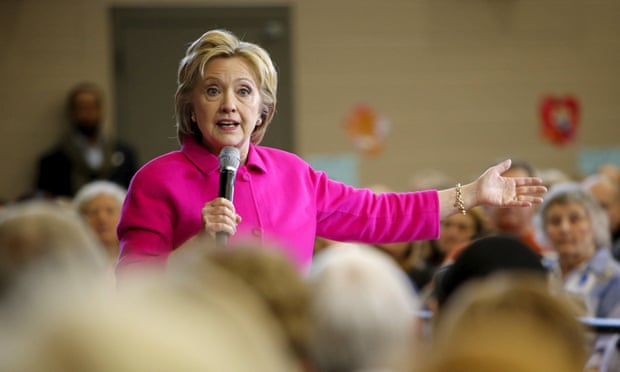“You are my Eleanor Roosevelt” a woman told Hillary Clinton at a town hall in Rochester, New Hampshire, on Friday afternoon, eliciting cheers and applause from the crowd.
Clinton waited out the whistles and shouts that echoed through the restoredRochester Opera House; instead of acknowledging the adulation, she stood in a listening pose on the stage that looked dressed for a production of Thornton Wilder’s Our Town. She held eye contact with the woman asking the question, until the eruption subsided.
When it did, the woman – a 30-year resident of Massachusetts who more recently moved to Maine – asked Clinton to explain what she wanted her presidency to mean to the young people of the future, other than the achievement of becoming first female president. “Give us a dream” the woman implored.
It would’ve been a hard question for any candidate to answer without platitudes or bombast – one can imagine what, for instance, Donald Trump would say. Politically speaking, it was a sensitive one for Clinton, who is running on the strength of Barack Obama’s accomplishments, to have to answer to what was implicitly a criticism of her old boss.
It’s not easy for most people to say what they hope others will see in their accomplishments – especially hypothetical ones. But Clinton may have it more difficult than most to imagine herself as the focus of someone else’s aspirations. After all, she spent close to three decades focused on the aspirations of her husband, and more than two decades as the target of her political opponents’ intense and rather personalized ire.
After acknowledging the compliment with Roosevelt, Clinton gave it a go. “I really want people to feel I’m working for them, to improve their lives” she began, eventually adding “I want people to feel, with me in the White House, I get it.”
The crowd cheered her answers, whether they were “a dream” or not, and Clinton said goodbye and began shaking hands to the tune of Sara Bareilles’ Brave (a common song at Clinton speeches and rallies). She stayed, as is apparently fairly common at her town halls, until there was almost no one left with whom to shake hands or take a selfie.
The public narrative about Hillary Clinton was written long ago – some of it before millennial women were born. She was the smart one, never the “pretty one”, the ambitious one, perhaps a little too much. She was analytical instead of emotional, and went back to work instead of baking cookies to help her husband’s career. She wasn’t good at hewing to the traditional standards of feminine conduct, and she was unapologetic about it. In the 80s and 90s, that didn’t make her a popular figure.
Her 2008 campaign focused on her competency (as though anyone had ever questioned whether Hillary Clinton were smart enough, or hard-working enough), and all-but ignored the question of her likeability, even after one emotional moment in New Hampshire left many women feeling connected to her in a very personal way.
And in 2016, the relentless focus on Clinton’s appeals to women, from Lena Dunham and Demi Lovato headliners in Iowa to a Planned Parenthood’s endorsement in New Hampshire, often ignores the fact many women simply like Clinton.
She has fans, and not just women who want a woman president, or who generally support women candidates, or voters who see her as the best shot to keep a Democrat in the White House. She has real, honest-to-goodness, dyed-in-the-wool supporters who don’t just want Clinton to win the White House, but fully expect she will. And they adore her.
Dianne Rochford of Newport, New Hampshire, who attended a Clinton speech with pro-choice and pro-Clinton buttons affixed to her sweatshirt, explained her support as one might explain something obvious to a particularly stupid child.
“She is a smart woman,” Rochford said. “She has always been for women and children. She has so much experience – she’s been secretary of State. Can I go on and on and on? Yes.”
But it’s not just Clinton’s resume that’s attractive: it’s clear that some of her supporters see themselves in Clinton, and their own dreams embodied in her candidacy.
Deb Andersen, like a lot of people at Clinton’s New Hampshire events, drove up from neighboring Massachusetts to catch her speech. The 64-year-old army veteran of Desert Storm and political junkie (she tries to see all the candidates and ask questions) spent much of the rally whistling loudly with two fingers while other clapped, and tried to ask Clinton a question by shouting “President Clinton!” during the question time. Afterwards, she declared herself a fan.
“Hillary’s not just going to be a woman in the White House, she’s going to be a woman with balls in the White House,” Andersen told the Guardian.
At a Naral event in Concord, Lynne Snierson, from Salem, New Hampshire, said: “I realize that younger women don’t necessarily connect with this, but for those of us who fought in the vanguard of the feminist movement in the 60s, the thought of a woman president resonates really deeply.”
“I’m 63,” she explained, “I was obviously born in 1952 and I understand that when I was a young woman, the thought of a woman being president was pie in the sky.”
Ilyse Hogue, the president of Naral, sees the support for Clinton as part of a larger cultural moment in which women are recognizing their own power. “We trained as women to put ourselves last in every way” she said.
“To have Hillary be a woman who says that it’s not only OK to put women at the center, but that it’s important because that’s how our families thrive and our marketplaces thrive … that’s revolutionary” she added.


No comments:
Post a Comment